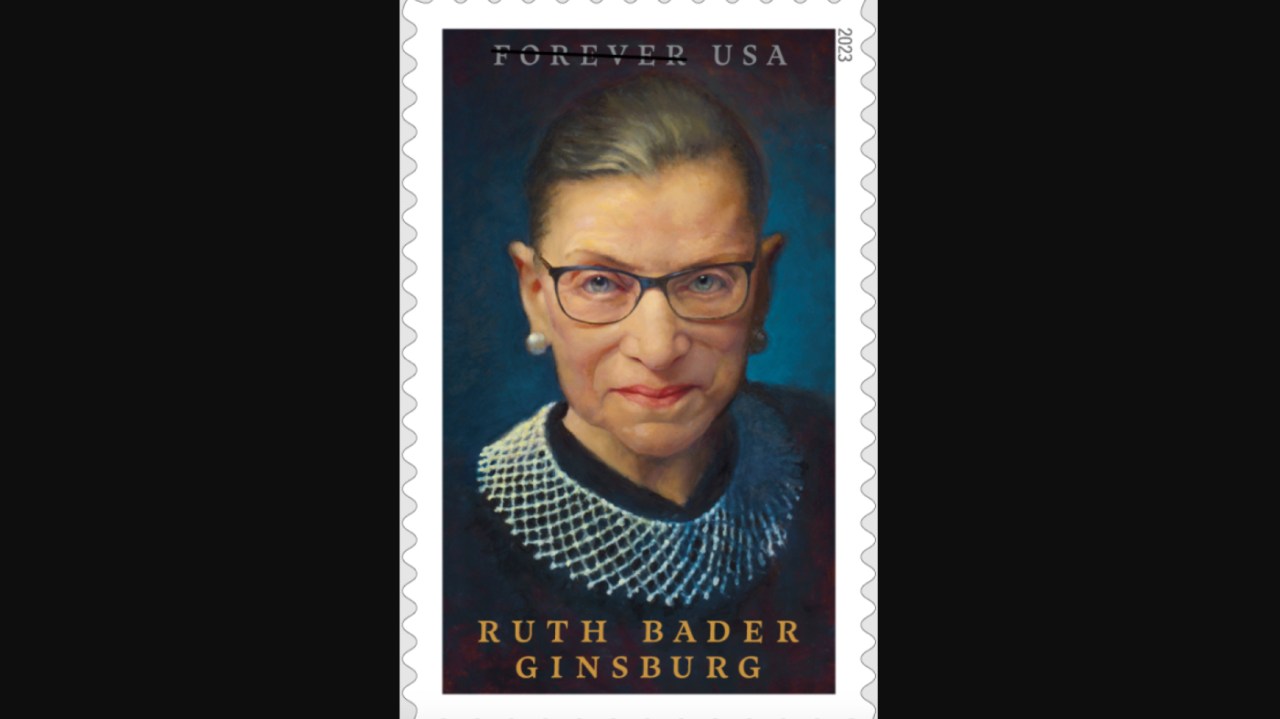The U.S. Postal Service (USPS) unveiled a stamp honoring late Supreme Court Justice Ruth Bader Ginsburg on Monday, where former colleagues, family and friends gathered to celebrate the justice’s legacy both on and off the bench.
“Now a new stamp will honor this outstanding American eminent jurist who gave so much to our country as a scholar, teacher, lawyer, judge and justice,” Supreme Court Justice John Roberts said in opening remarks at the National Portrait Gallery.
The stamp features an oil painting of Ginsburg wearing her black judicial robe and white collar. Postal Service art director Ethel Kessler designed the stamp with art by Michael J. Deas, which was based on a photograph by Philip Bermingham.
Ginsburg passed away at the age of 87 in 2020 due to complications from pancreatic cancer. She served on the Supreme Court for 27 years.
Ginsburg’s granddaughter, Clara Spera, called the stamp “particularly special,” among the tributes to her grandmother.
“Of the many honors my grandmother has received, this stamp is especially fitting and not only because the Supreme Court has had occasion to interpret the postal clause found in Article 1 Section 8 of the Constitution,” Spera said.
“Indeed, stamps played a large role in my grandmother’s life from long before she ever sat on a federal bench,” she continued, telling stories of Ginsburg as a mother and grandmother.
Roman Martinez IV, the chairman of the USPS Board of Governors, said the stamp honors not only Ginsburg, but in effect, the Supreme Court as well.
“The one particular thing that I admire was her ability to persevere, her ability to fight for what she believed in, but to do it so in a civil way,” Martinez said, who added the country needs more of Ginsburg’s spirits amid sharpening divisions.
“And as we Americans use her forever stamp, let us hope forever remember what binds us together as a nation,” he continued.
Pointing out USPS receives thousands of suggestions each year for new subjects, Martinez said the postal service is “proud” to be issuing a stamp in her honor. Out of the 103 Supreme Court justices who have passed away, only 14, now including Ginsburg, have been on a stamp.
Nina Totenberg, an American legal affairs correspondent for National Public Radio, said she interviewed Ginsburg dozens of times throughout the years. She remembered Ginsburg for changing “the way the world is for American women,” while sharing stories of their exchanges.
The first-class Forever stamp will be sold in panes of 20, according to the service. Each stamp costs 66 cents.



Throwing your life’s work down the crapper because she wanted to hold on to power. She took Roe v. Wade with her to the grave and set the feminist movement back to the 1950s.
I mean literally if she had retired during Obama administration we likely wouldn’t be in the same mess. Can directly blame her for the loss of roe vs Wade.
Potentially. A SCOTUS seat opened when Obama was in office, but Republicans actively prevented it from being filled.
A great Innuendo Studios video about this behavior: https://youtu.be/MAbab8aP4_A
The pressure campaign for RBG to retire was when democrats still held a senate majority with 53 seats. Republicans blocked Obama’s SCOTUS appointment when they held the senate majority. In 2016, republicans simply just didn’t allow a vote to happen because the senate leader sets the vote schedule. The nuclear option had already been invoked by that very same dem caucus on all other presidential nominations too.
The scenarios look similar on a surface level but in the details that matter they are leagues apart. If RBG had retired in 2013 or (most of) 2014, her replacement would been confirmed, barring a Kavanaugh-sized scandal. Either republicans would have provided the seven votes needed to secure cloture, or Reid would have invoked the nuclear option to lower the cloture requirement on SCOTUS nominees to a bare majority, like all other positions. Either way the nominee would have been confirmed.
Well said. There’s a reason why pride is one of the seven deadly sins.